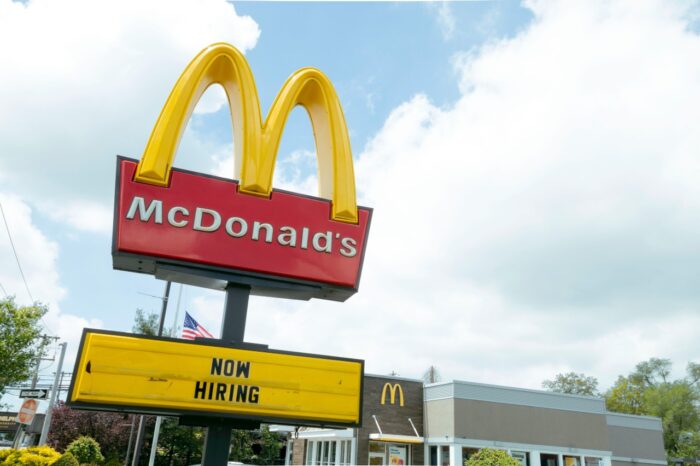Top Class Actions’s website and social media posts use affiliate links. If you make a purchase using such links, we may receive a commission, but it will not result in any additional charges to you. Please review our Affiliate Link Disclosure for more information.

Update:
- McDonald’s defeated a 2019 class action lawsuit claiming it entered into non-compete agreements with franchisees that prohibited McDonald’s locations from hiring one another’s employees.
- An Illinois federal court granted a bid from McDonald’s June 28 to escape the claims.
- Ex-workers alleged the fast food chain used no-poach provisions in its franchise agreements.
- U.S. District Judge Jorge Alonso issued the order and opinion granting McDonald’s motion for judgment on the pleadings, which argued there was too much competition for their labor to support an antitrust case.
- The judge said the plaintiffs needed to show that McDonald’s had power over the local labor markets at issue.
(Aug. 19, 2019)
A class action lawsuit claims that McDonald’s entered into non-compete agreements with franchisees, which prohibits McDonald’s locations from hiring one another’s employees.
The McDonald’s class action lawsuit was filed by Stephanie Turner who says she worked for a corporate-owned McDonald’s restaurants as well as franchisee-owned McDonald’s restaurants for around 15 years.
Turner alleges that McDonald’s and its franchisees entered into agreements that forbids locations from hiring workers from other locations.
According to Turner, this occurred during her time with McDonald’s and caused her to suffer reduced wages and a loss of professional growth opportunities.
The McDonald’s class action lawsuit states that McDonald’s prohibited corporate locations and franchisee-owned locations from “employ[ing] or seek[ing] to employ,” anyone who works (or in the last six months has worked) as an employee at McDonald’s, a McDonald’s subsidiary, or any other McDonald’s franchise.”
The McDonald’s class action lawsuit says that this policy played out in Turner’s career in a number of ways. Allegedly, she was told on numerous occasions that she could not seek jobs with other McDonald’s restaurants without getting a “release from her current employer.”
Turner said that this practice prohibited her from seeking other jobs and promotions within McDonald’s. Additionally, she says that this kept her wages subsequently lower than they would have been if the company had not entered into these agreements.
Allegedly, McDonald’s entered into this agreement so that they would not have to offer competitive wages or benefits. Turner says that decreasing workers’ mobility lowered the need for McDonald’s to offer competitive benefits to vie for their employees.
The McDonald’s class action lawsuit says that around 420,000 employees work for McDonald’s or its franchises, and claim that many employees were affected like Turner.
The McDonald’s class action lawsuit says that before March 2017, all franchise agreements between a franchise and the corporate McDonald’s included an agreement that prohibited franchisees from employing or seeking to employ a current employee of McDonald’s.
To support her claim that this agreement was anticompetitive and bad for workers, Turner notes that since the late 1990s, McDonald’s has “continually attempted to reduce labor costs,” an effort which allegedly included replacing employees with electronic kiosks and paying employees less than a living wage.
Turner claims that 84 percent of all fast food employees working in New York City in April 2013 were paid less than their legal wages by employers. She also notes that McDonald’s allegedly engaged in “rampant” wage theft, according to the Roosevelt Institute.
Turner is represented by Derek Y. Brandt, Leigh M. Perica, Richard D. McCune and Michele M. Vercoski of McCune Wright Arevalo LLP; Dean Harvey, Anne B. Shaver, Lin Y. Chan, Yaman Salahi, and Jeremy J. Pilaar of Lieff Cabraser Heimann & Bernstein LLP; Walter W. Noss, Stephanie A. Hackett, Sean C. Russell, and Michelle E. Conston of Scott + Scott Attorneys at Law LLP.
The McDonald’s Hiring Conspiracy Class Action Lawsuit is Stephanie Turner v. McDonald’s USA LLC, et al., Case No. 1:19-cv-05524, in the U.S. District Court for the Northern District of Illinois, Eastern Division.
ATTORNEY ADVERTISING
Top Class Actions is a Proud Member of the American Bar Association
LEGAL INFORMATION IS NOT LEGAL ADVICE
Top Class Actions Legal Statement
©2008 – 2024 Top Class Actions® LLC
Various Trademarks held by their respective owners
This website is not intended for viewing or usage by European Union citizens.















15 thoughts onMcDonald’s class action over no-poach agreements dismissed
Add
Add me please
Add me